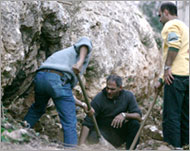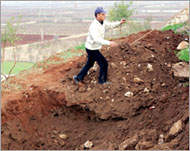Mass grave found in Lebanon
Troops have exhumed the remains of 25 bodies from a mass grave near a former Syrian military base in eastern Lebanon.

An official on Saturday said 12 more buried bodies, most thought to be Lebanese soldiers, were removed from a grave near Beirut recently for DNA testing.
The identities of the bodies were not immediately known, but one security official said some appeared to be Lebanese soldiers killed during an October 1990 Syrian military offensive that defeated Christian-commanded Lebanese Army units of the then-interim Lebanese prime minister Michel Aoun.
Residents of the eastern Bekaa Valley town of Anjar, near the former headquarters of Syrian military intelligence in Lebanon, found the grave containing the 25 bodies last week, the official said on condition of anonymity as he was unauthorised to speak to the media.
Soldier’s uniform
Anjar residents informed Lebanese authorities about the bodies, at least one of which was dressed in a Lebanese soldier’s uniform.
The remains, including bones, teeth and skulls, were taken from the mass grave on the Nabi Azir hilltop position formerly occupied by Syrian soldiers, about a kilometre from the former headquarters of Syrian military intelligence in Lebanon.
 |
|
Inspectors checked a site where |
“This is the biggest proof that the crime is very big and touches the lives of hundreds of Lebanese families,” said Ghazi Aad, director of Support of Lebanese in Detention and Exile, which works for the release of Lebanese prisoners in Syrian jails and learning the fate of missing people.
Aad called for an international investigation into the mass graves.
Although there are no exact figures, human rights groups and families say they have evidence of more than 176 Lebanese still in Syrian jails, many of whom have been there for more than a decade. About 17,000 Lebanese are unaccounted for from the 1975-90 civil war.
Black bags
Lebanese soldiers barred journalists on Saturday from approaching the grave site, only allowing photographers to take pictures of them refilling the earth pit with bulldozers after their work was done.
Journalists, however, saw troops collecting the remains in at least 12 black bags. The remains were then taken for DNA testing, said the official.
The Anjar headquarters was notorious for the arrest and torture of prisoners, and residents of the area are thought to have known for years of the grave’s existence but declined to speak out because of the presence of Syrian troops, who were based in Lebanon since the early stages of the civil war.
 |
|
The Anjar headquarters was |
Syria vacated the headquarters on 25 April as it removed its soldiers and ended its 29-year domination of Lebanon.
Another security official said the Lebanese army dug out the remains of at least 12 bodies from the Defence Ministry compound in Yarze, near Beirut, in mid-November. Digging operations are continuing in Anjar and at another location in the mountains east of Beirut.
Most of the bodies exhumed from Yarze are thought to belong to Lebanese soldiers killed during the Syrian military offensive in 1990 that ousted Aoun, but they were not identified at the time because DNA testing technology did not exist, the official said on condition of anonymity as he was unauthorised to speak to the media.